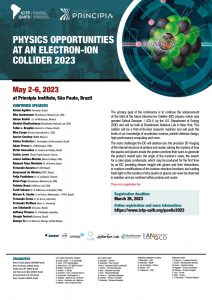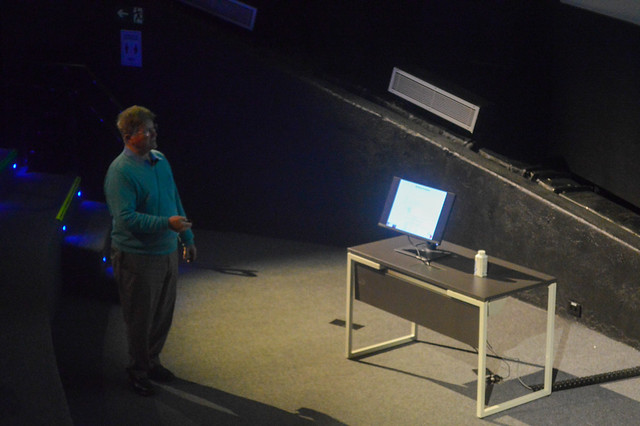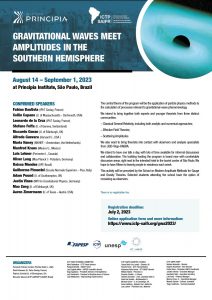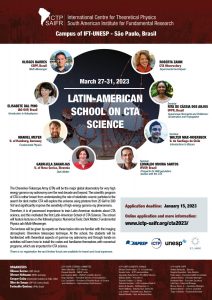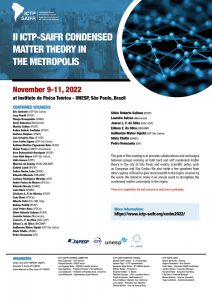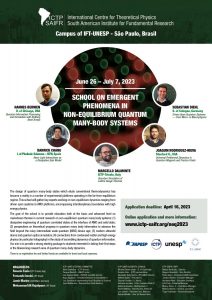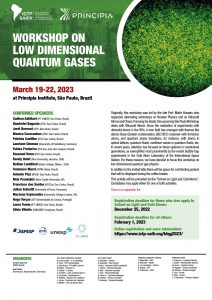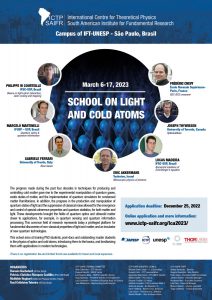The Serrapilheira/ICTP-SAIFR Training Program in Quantitative Ecology from January 9 – March 3, 2023 will train young scientists studying at Brazilian institutions for world-class research on ecology using the quantitative methods of mathematics, physics, and computer science. It strategically makes use of the country’s well-established excellence in mathematics and physics to tap into Brazil’s tremendous potential in ecology and correlated areas (such as epidemiology and evolution).
Brazil’s ecosystems are among the richest in the world, and it is becoming increasingly clear that their inherent complexity poses enormous scientific challenges to find solutions that allow them to survive and flourish. The goal is to build an interconnected network of highly skilled scientists who can make significant contributions to advance the field in Brazil and Latin America.
To reach its goal, the training program will be highly selective and involve students who have already developed quantitative skills and are interested in applying these skills in solving cutting-edge problems in ecology. Lectures in all sub-fields of ecology will be presented by international experts, and no previous knowledge of biology is required.
After a one-month online version of the program in July 2021, and a five-month in-person program from July-November of 2022, the two-month program in January-February of 2023 will focus on models and methods related to ecology. Students selected to the program will receive accommodations in São Paulo and a monthly stipend for food and transportation, as well as airfare from their home city.
Students with quantitative skills who are either enrolled in an undergraduate program or have finished their undergraduate studies at Brazilian institutions and have not yet begun their doctoral degree can apply to participate in the two-month training program. Any questions should be sent to qecoprogram@ictp-saifr.org
Click here for Application Instructions in Portuguese.
Click here for Application Instructions in English.
Please send any questions to qecoprogram@ictp-saifr.org


Deterministic Mathematical Modeling
• Roberto Kraenkel (IFT-Unesp)
Google Scholar: Click here
Roberto Kraenkel works on mathematical biology and complex systems, with applications to ecology and epidemiology (infectious disease dynamics); and research on nonlinear dynamics of water waves, population biology, water reservoirs, and early warning signals of critical transitions.
Statistical models: linking data to theory
• Paulo Inacio Prado (USP)
Google Scholar: Click here
The main research interest of Paulo Inácio Prado is theoretical ecology, with a focus on community ecology, studying the variation of biological diversity at different scales through data analysis and building statistical and mathematical models in population and community ecology.
• Diogo Melo (Princeton University)
Google Scholar: Click here
Diogo Melo’s research focuses on understanding the interplay between genetic and environmental covariation in shaping phenotypic differences between individuals and complex trait evolution. He aims to understand how this complex genetic architecture responds to environmental perturbation and genetic variation and how this leads to the wide array of phenotypic variation observed in nature. His research couples quantitative and population genetics with functional genomics and computational tools.
• Andrea Sanchez-Tapia (RLadies, The Carpentries and The Turing way)
Google Scholar: Click here
Andrea Sánchez-Tapia’s main interests are biodiversity informatics and plant ecology. She is a quantitative ecologist with a strong background in ecological niche modeling, biodiversity informatics, and data analysis in R. She develops reproducible biodiversity informatics workflows for ecological niche models, occurrence data cleaning, standardization to DwC (Darwin Core Standard), taxonomical and geographical validation, and data processing for IUCN (International Union for Conservation of Nature) extinction risk analysis.
• Paula Lemos Costa (University of Chicago)
Google Scholar: Click here
Paula Lemos-Costa’s research focuses on finding ways to answer ecological and evolutionary questions from a theoretical perspective. She analyzes interactions between species and their influence on coevolutionary dynamics, the role of spatial structure in promoting diversity at different levels and, in general, what drives (and generates) biodiversity patterns.
Computational methods for simulating and analyzing ecological models
• Renato Coutinho (UFABC)
Google Scholar: Click here
Renato M. Coutinho’s work focuses on understanding biological systems (such as populations, communities, and the spread of infectious diseases) through mathematical models applied to evolution, ecology, epidemiology. He uses differential equations — ordinary, partial, delayed — and mappings, frequently using numerical simulations. His main research topic is population dynamics in space, population dispersal/diffusion and metapopulations and metacommunities, seeking to understand the influence of space in fragmented landscapes at large scales and for long periods.
Quantitative Foundations of Ecological and Evolutionary concepts
• Joshua Weitz (Georgia Tech)
Google Scholar: Click here
Joshua Weitz and his team study how viruses affect human health and the fate of our planet at multiple scales including the molecular, populational and evolutionary scales. Weitz works on the structure and dynamics of complex biological systems, theoretical ecology and evolutionary biology, and disease dynamics and epidemiology.
• Stephen Beckett (Georgia Tech)
Google Scholar: Click here
Stephen Beckett’s research focuses on computational ecology, investigating and solving ecological and environmental problems with mathematical and computational methods. His current research interests lie in investigating the ecology of aquatic microbial communities — interactions and coevolutionary processes that mediate community structure and dynamics of microbial ecosystems.
• Jacopo Marchi (Georgia Tech)
Jacopo Marchi is interested in studying biological systems using theoretical models that capture the key features leading to the observed experimental behavior, borrowing tools from nonlinear dynamics and statistical mechanics. Marchi works on bacteriophage therapy research. He is addressing how to steer the co-evolution between phages and bacteria to devise successful therapy strategies.
Out of Equilibrium dynamics in Ecological Systems
• Karen C. Abbott (Case Western Reserve University)
Google Scholar: Click here
Karen Abbott’s main research interests are theoretical population and community ecology. She uses mathematical models to understand species occurrence and abundance based on identifying natural phenomena. More recently, Prof. Abbot’s lab includes spatial synchrony in forest insect outbreaks, plant-herbivore dynamics, evolution and climate change in plant-pollinator communities, impact and spread of invasive species, and the application of linear models to ecological time series.
Non-linearity, variability and diversity: an integrative perspective
• Priyanga Amarasekare (UCLA)
Google Scholar: Click here
Priyanga Amarasekare’s research focuses on how the interplay between abiotic environmental variation and biotic interactions influences ecological and evolutionary dynamics. Her research broadly encompasses investigations of the interplay between biotic interactions and temporal variation on the one hand, with temperature as the axis of abiotic variation and biotic interactions and spatial variation on the other, with dispersal as a mechanism for spatial sampling heterogeneity. Prof. Amarasekare works on spatial dynamics of population regulation, species interactions and the evolution of dispersal; dynamics and diversity of multi-trophic communities; effects of temperature variation on population dynamics, species diversity and the evolution of thermal reaction norms.
Evolutionary game theory and transitions
• Vitor Vasconcelos (University of Amsterdam)
Google Scholar: Click here
Vitor Vasconcelo’s research focuses on managing complex systems to solve societal challenges concerning the provision of public goods. Research topics include the interplay between the decision-making dynamics and the dynamics of goods and resources, and the institutional approach to cooperative governance of risky commons.
Metapopulation Dynamics
• Lisa C. McManus (University of Hawai’i-Manoa)
Google Scholar: Click here
Lisa McManus’s research uses theoretical approaches to elucidate marine system population and community dynamics. The interests of Lisa McManus focus on understanding coral reefs’ potential responses to climate change, their population adaptive capacity; and conservation and spatial management for evolving coral populations.
Receive e-mail notification of the upcoming Seminars in Quantitative Ecology and Talks on Transversal Themes in Science by filling out the form here.
There is no registration fee and the link to participate online will be sent by email.
• Deterministic Mathematical Modeling
Speaker: Roberto Kraenkel – Institute of Theoretical Physics at UNESP, Brazil
VIDEO PLAYLIST (classes from 09 of January to 03 of February, 2023)
• Computational methods for simulating and analyzing ecological models
Speakers: Renato Coutinho – UFABC
VIDEO PLAYLIST (classes from 09 of January to 03 of February, 2023)
• Statistical models: linking data to theory
Speakers: Paulo Inacio Prado – USP; Diogo Melo – Princeton University); Andrea Sanchez-Tapia – RLadies, The Carpentries and The Turing way; Paula Lemos Costa – University of Chicago
VIDEO PLAYLIST (classes from 09 of January to 02 of February, 2023)
• Quantitative Foundations of Ecological and Evolutionary concepts
Speakers: Joshua Weitz – Georgia Tech; Stephen Beckett – Georgia Tech; Jacopo Marchi – Georgia Tech
VIDEO PLAYLIST (classes from 06 of February to 15 of February, 2023)
Participants
| Amanda Maciel de Oliveira | Universidade Federal do Paraná | Paraná |
| Anna Carolina Dias de Almeida | Universidade de São Paulo | São Paulo |
| Danielle Santos Silva | Observatório de Aves da Mantiqueira | Tocantins |
| Gabriel Marins | Universidade de Brasília | Distrito Federal |
| Gabriella Dantas Franco | Universidade Estadual de Campinas | Minas Gerais |
| Guilherme Hilário Monteiro | Universidade Federal do Rio de Janeiro | Rio de Janeiro |
| Isabela Castro | Universidade de Brasília | Distrito Federal |
| Joaquim Flesch Salaberry | Universidade Federal do Rio Grande do Sul | Rio Grande do Sul |
| Kaluan Calini Vieira | Universidade Federal do Rio Grande do Sul | Rio Grande do Sul |
| Kelmer Martins da Cunha | Universidade Federal de Santa Catarina | Santa Catarina |
| Laymara Xavier | Universidade Federal do Ceará | Ceará |
| Leonardo de Oliveira Soares Espinosa | Universidade Federal do Rio Grande | Rio Grande do Sul |
| Luddy Searom | Universidade Estadual de Maringá | Paraná |
| Luís Matheus Tavares Silva | Universidade Federal do Ceará | Ceará |
| Maria Gabriella Basilio | Universidade Federal do Rio de Janeiro | Rio de Janeiro |
| Matheus Guthierris Bitencourt Rosa | Instituto Nacional de Pesquisas da Amazônia | Amazonas |
| Matheus Stefanini Mariano | Universidade de São Paulo, São Carlos | São Paulo |
| Melina Ferreira Martello | Universidade Federal do Rio Grande do Norte | Rio Grande do Norte |
| Micael Siegert Schimmunech | Universidade Federal do Paraná | Paraná |
| Miguel Piovesana Pereira Romeiro | Universidade Estadual Paulista, São Vicente | São Paulo |
| Moise Leance Sagbohan | Universidade Federal do Pará | Pará |
| Paula Mazza Barbosa Oliveira | Universidade Federal de Juiz de Fora | Minas Gerais |
| Pedro Augusto de Souza Wolf | Universidade Federal Fluminense | Rio de Janeiro |
| Pedro Henrique Pinheiro Cintra | Universidade Estadual de Campinas | Distrito Federal |
| Pedro Masotti Moretti da Silveira | Universidade de São Paulo, São Carlos | São Paulo |
| Rhanna Drielly Lobato dos Prazeres | Universidade Federal do Pará | Pará |
| Sarah Henaut Jacobs | Universidade Estadual do Norte Fluminense | Rio de Janeiro |
| Tiago Mourão | Centro Brasileiro de Pesquisas Físicas | Rio de Janeiro |
| Tiffany Vilca Wanderley | Fundação Universidade Federal de Rondônia | Rondônia |
| Yildiz Jordan Bouchon | Universidade Federal do Pará | Pará |
Organizers
Paulo Teixeira
Thiago Codinhoto
Advisory Board
Jordi Bascompte
Professor of Ecology at the University of Zurich, Switzerland, and director of the master’s Program in Environmental Sciences at the same university.
William Bialek
John Archibald Wheeler/Battelle Professor in Physics at Princeton University, USA, Visiting Professor of Physics at The Graduate Center at CUNY,USA, co-director of the Center for the Physics of Biological Function (The Graduate Center at CUNY and Princeton University).
Thiago Carvalho
Graduate Program Coordinator at the Champalimaud Foundation, Portugal.
António Coutinho
Former director of the Doctoral Program of the Gulbenkian Institute of Science (IGC), in Portugal.
Akiko Iwasaki
Professor at Yale University and principal investigator at the Howard Hughes Medical Institute (HHMI), USA.
Maria Leptin
Director of the European Research Council (ERC).
Simon Levin
James S. McDonnell Distinguished University Professor in the Department of Ecology and Evolutionary Biology at Princeton University (USA) and Director of the Center for BioComplexity at the Environmental Institute, also at Princeton.
Gabriel Mindlin
Professor of Physics at the University of Buenos Aires.
Stevens Rehen
Director of Research at Instituto D’Or de Pesquisa e Ensino (IDOR) and Full Professor at the Federal University of Rio de Janeiro (UFRJ).

